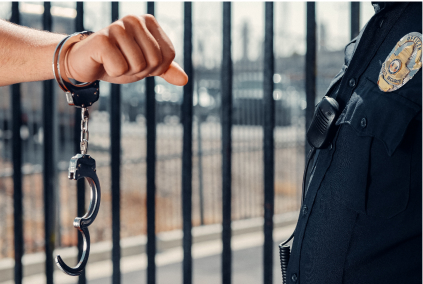
The cost of representing yourself in a divorce.
November 4, 2014
Revenge Porn: Not a Good (or Legal) Holiday Gift
December 22, 2014Mockingjay – Part one, the third movie in the Hunger Games trilogy is coming out next week, so what could be better than a blog post showing how Utah is just like District 12? Well, maybe not exactly like District 12…but closer than you might think.
In the Hunger Games trilogy, the Capitol has immense power and it maintains its power, in part, by establishing laws to maintain peace and order in its districts. The Capitol enforces its laws by way of the “Peacekeepers”—a law enforcement force which uses harsh tactics to monitor and regulate the people with an iron fist. The strict laws and the broad discretion given to the Peacekeepers allow the Peacekeepers to exercise their power over the people without worry of being punished for unjust or malicious actions.
In Utah, there are approximately 10,700 criminal laws on the books at the city, county, and state level. There are at least another 4,500 federal crimes  (Congressman James Sensenbrenner asked the Congressional Research Service to compile a list of all of the federal crimes and he was told the office didn’t have the manpower and resources to make such a list).
(Congressman James Sensenbrenner asked the Congressional Research Service to compile a list of all of the federal crimes and he was told the office didn’t have the manpower and resources to make such a list).
Every year, the Utah State Legislature passes hundreds of new laws, but despite this influx of new laws, usually only a handful of old criminal laws are removed. To enforce these laws, the State and its various local municipalities employ various forms of law enforcement. While there is much more oversight and regulation of a police force than we see over the Peacekeepers of District 12, officers still hold an incredible amount of power.
For example, the U.S. Constitution prohibits unreasonable searches or seizures, requiring that any arrest or detainment be reasonable. The U.S. Supreme Court set guidelines for the evidence required to define what is “reasonable” in various circumstances and levels of interaction.
For an officer to simply stop and talk to someone on the sidewalk, a voluntary encounter, no evidence of a crime is necessary. But if they want to detain someone or keep them from leaving, an officer must show that there is “reasonable suspicion” that they committed a crime. If they can articulate a reason for their suspicion, they can hold someone.
An arrest requires an slightly greater showing of evidence. For an arrest, an officer must show “probable cause,” which is the point where “a person of reasonable caution would conclude that there’s a probability that a person committed the alleged crime.” But even though that sounds like the police have to have some solid evidence to make an arrest, they really don’t. The courts have said that probable cause can be less than 50% certainty. So you and I can be arrested even if the officer thinks that we probably didn’t commit the crime, and even if the evidence is based on hearsay, as long as there is a “reasonable probability” that we did.
All of these standards seemingly provide a great deal of comfort until the thousands of state, federal and municipal laws come back into play. With so many laws, some of which are so broad that they can apply to countless situations, police officers have a wide berth. For example, think of all the traffic laws and laws like “disorderly conduct” and “criminal mischief” for which we can be arrested. Not coming to a full stop at a sidewalk before entering a roadway could be grounds for arrest. Same goes for a busted tail light or making loud noises in public and on and on.
One book, titled Three Felonies A Day, states that most people go about their regular lives unknowingly committing several federal crimes simply because there are so many laws. And even if you or I are arrested but later the charges are dropped or we are shown to be innocent, just being charged can cost a lifetime of pain. Records of arrests are made public. Bailing out of jail and hiring an attorney could cost many thousands of dollars. And if you don’t have the money to bail out, you have to sit in jail until your case is concluded weeks or months or years later.
 Of course, Utah officers are not District 12 Peacekeepers, and most officers are an honorable and important part of our society and communities. And without them, we would likely feel much less safe, perhaps living in a society more like the wild west. But the truth is, they, like all groups of people in society, are comprised of different types, some good, some bad. Some honest, some dishonest. Some who use their power responsibly, and some who use their power irresponsibly.
Of course, Utah officers are not District 12 Peacekeepers, and most officers are an honorable and important part of our society and communities. And without them, we would likely feel much less safe, perhaps living in a society more like the wild west. But the truth is, they, like all groups of people in society, are comprised of different types, some good, some bad. Some honest, some dishonest. Some who use their power responsibly, and some who use their power irresponsibly.
In my mind, the most obvious way we are getting closer to the dystopia in the Hunger Games is that we are giving more and more power to the government by way of new laws to enforce and greater power to enforce them.
Before a decision made by the U.S. Supreme Court in the 1980’s, officers couldn’t pull someone over for a traffic violation when they were really planning on doing a drug search, because there was a “pretext” (fake reason) for stopping the citizen. But the high court decided it was too difficult to determine whether officers were telling the truth and ruled that as long as they can show reasonable suspicion of any traffic violation they can stop someone (even if it’s just to look in your windows and smell for Colorado-made products).
So now, as long as police can show any kind of reasonable suspicion for any of the 10,000 local laws or 4,500 federal laws, they can seize you for further investigation. And if you are defiant or act like a know-it-all citizen when they stop you, all they have to do is find probable cause (less than 50% certainty) for one of those crimes, and they can put you in cuffs and take you to jail.
In my experience, most officers (like most people), are good. However, like English Lord Acton said, “Power tends to corrupt, and absolute power corrupts absolutely.” So in the first place, we should be more careful about passing more and more criminal laws each year. And second, we should make sure we watch the watchers by carefully scrutinizing the actions of police. Yes, it will make their job harder to do, but checks on power are fundamental to maintaining our freedom.
No one wants a lawless society, but no one wants to live in District 12, either.
Can’t get enough of the Hunger Games? Intermountain Legal is giving away tickets to the premiere of “Mockingjay – Part 1” – the third installment of the Hunger Games series! Check out our promotions page for more info and to enter.





